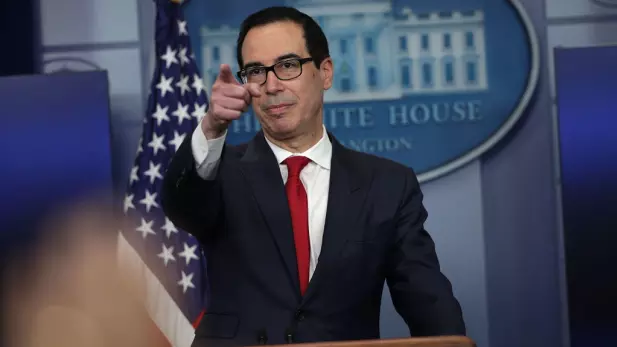Media Report

- The New York Times reports: "The Trump administration has imposed sanctions on a Chinese bank, a Chinese company and two Chinese citizens in an effort to crack down on North Korea's financing and development of weapons of mass destruction. The sanctions follow the death of Otto F. Warmbier, an American student who was imprisoned by North Korea, and come as frustration grows in the United States government over the North's missile tests. The most significant action is directed at the Bank of Dandong, a Chinese lender that Treasury officials say acts as a conduit for illicit North Korean financial activity and money laundering. The department's Financial Crimes Enforcement Network is moving to sever the bank from the American financial system, which would severely limit its ability to work with other banks around the world. 'We will follow the money and cut off the money,' Steven Mnuchin, the Treasury secretary, said Thursday during a briefing at the White House."
- The Financial Times reports: "China lashed out at the US on Friday over its announcement of an arms sale to Taiwan, amid what appears to be a sea change in the Trump administration's policy towards Beijing. The foreign ministry in Beijing said Thursday's $1.4bn deal had 'severely damaged China's security and sovereignty', and that Taiwan was 'an indispensable part of China's territory' It added that Beijing had made official protests to US officials in both capitals. The US move to impose sanctions on Bank of Dandong, a Chinese lender that the White House has accused of laundering money for North Korea, also elicited a rebuke from Beijing. 'We firmly oppose any unilateral sanctions outside the framework of the [UN] Security Council,' the ministry said, adding that if there was evidence of wrongdoing, China would handle the matter itself within the scope of its own laws. The White House moves this week follow the apparent failure of President Donald Trump's efforts to enlist Beijing's support for tougher UN sanctions against Pyongyang."
- Vox comments: "The Trump administration's months-long effort to be gentle in encouraging China to rein in North Korea is officially over.On Thursday, the White House announced that it's slapping sanctions on a Chinese bank, a Chinese company, and two Chinese individuals for their ties to North Korea — an unambiguous sign that patience over China's reluctance to help curtail Pyongyang's nuclear program has grown thin. 'While we will continue to seek international cooperation on North Korea, the United States is sending an emphatic message across the globe that we will not hesitate to take action against persons, companies, and financial institutions who enable this regime,' Treasury Secretary Steve Mnuchin said in a statement. Consider this the opening salvo of the administration's new strategy, which is an attempt to make China's leaders pause and re-evaluate their usual tactic of dragging their feet on pressuring North Korea. China has a strategic interest in keeping North Korea stable, in part because it acts as a buffer against having rivals like South Korea and the US right at its border, and in part because it fears that instability or regime collapse could lead to a massive influx of refugees pouring over the border into China."
Calendar
- 2017-06-29 China Tells U.S. Senate to Keep Its Nose Out of Taiwan
- 2017-06-28 Soybean Diplomacy: New U.S. Ambassador to China Touts Agricultural Trade
- 2017-06-27 China And The U.S. Are Cooling Their Cooperation To Curb North Korea
- 2017-06-27 China And The U.S. Are Cooling Their Cooperation To Curb North Korea
- 2017-06-26 New U.S. ambassador to China says North Korea a top priority
- 2017-06-25 There's No End in Sight for China's Rise Up the GDP Rankings
- 2017-06-23 Xi Jinping Is Set for a Big Gamble With China’s Carbon Trading Market
- 2017-06-22 Exclusive: South Korea president calls on China's Xi to do more on North Korea nuclear program
- 2017-06-21 China stocks hit 18-month high on MSCI inclusion
- 2017-06-20 China tour agency says won’t take more US tourists to NKorea
News
- The New York Times U.S. Imposes New Sanctions Over North Korea Ties
- The Financial Times China hits back against US arms sale to Taiwan
- Reuters UK China protests U.S. bill calling for port visits to Taiwan by navy
- The Washington Post Pakistan pivots to China amid fresh concerns over US ties with India
- The New York Times U.S. Seeks to Keep Closer Tabs on Chinese Money in America
- CNN International US, China relations begin to cool as Trump's honeymoon with Xi ends
- The Wall Street Journal China to Open Mainland-Hong Kong Bond-Connect Link on July 3
- The Wall Street Journal China Manufacturing Gauge Strengthens on Growing Global Demand
- The Washington Post China flexes military muscle in Hong Kong during Xi's visit
- CNBC China builds new military facilities on South China Sea islands: think tank
- Reuters Ailing China dissident Liu's 'time limited', says family member
- CNBC China says no thanks to talks with South Korea, Japan as THAAD remains contentious issue
- The New York Times Drought in Northern China Is Worst on Record, Officials Say
Commentary
- Vox Why Trump just slapped new sanctions on Chinese banks
- Quartz "If you are born and raised in Hong Kong, you care about Hong Kong's future more than anything"
- Bloomberg China, Not Supply, Holds Key to Oil's Next Move
- Bloomberg What South Korea's 1997 Meltdown Can Teach China in 2017
- Forbes A Closer Look At Johnson Controls' Focus On China
- Quartz Why the rainbow flag emoji flooded the Facebook livestream of Chinese leader Xi Jinping's remarks in Hong Kong
- Forbes China's Most Infamous 'Ghost City' Is Rising From The Desert